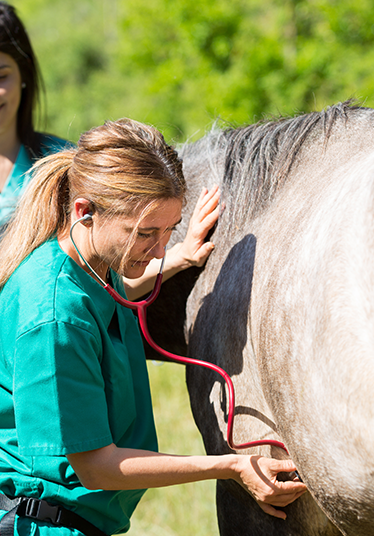This course is suitable for applicants who have significant experience working with equine breeding stock and/or who regularly assist veterinarians to synchronise mares cycles for conceptions, manage foaling mares, oversee breeding programmes and who want a more in-depth understanding of the physiology of reproduction in the horse. Applicants interested in learning about the newest scientific advances in this field that practically benefit breeding efficiencies will also find the course valuable.

Equine Reproduction & Fertility
Overview
| Subject Area | Equine Reproduction & Fertility |
| Credits | 10 |
| NFQ | 8 |
| EFQ | 6 |
| Start Date | 19th January 2026 |
| Duration | 12 Weeks |
| Mode of Delivery | Online |
| Course Leader | Assoc Prof Barbara Murphy |
| Fee | Full Fee: €1280 |
| Application Deadline | 15th January 2026 |
This micro-credential focuses in detail on the physiology and endocrinology of reproduction and breeding management within the Thoroughbred and Sport Horse industries. The module encompasses lectures on equine reproductive anatomy, seasonality, the hormones of reproduction, ovarian and testicular function, sperm and oocyte development, establishment and maintenance of pregnancy and parturition, neonatal care, and breeding soundness examinations. Emphasis will be placed on the current state-of-the-art in research knowledge in these areas. Topics covered will include current advances in equine assisted reproductive technologies and pharmacological manipulation of the mare’s reproductive cycle.
On completion of this micro-credential you should be able to:
- Describe the detailed anatomy and functions of mare and stallion reproductive tracts;
- Explain the endocrine control of reproduction in the stallion and the mare;
- Discuss factors that influence sperm production, reproductive cycles, ovarian follicular growth and the establishment and maintenance of pregnancy in the horse;
- Evaluate the efficiency and impact of pharmacological manipulation of the mare's reproductive cycle;
- Discuss how seasonality and photoperiodic management impacts fertility for the mare and stallion and the growth and development of the foal;
- Explain the different management strategies employed for artificial insemination versus natural cover breeding;
- Evaluate assisted reproductive technologies and their effectiveness;
- Discuss care and management of the neonate in health and disease;
- Apply knowledge of reproductive physiology to formulate solutions to breeding management problems in horses;
- Critically assess the current state of knowledge in relation to specific equine reproductive topics.
- Mare Reproductive Anatomy
- Folliculogenesis
- Mare Seasonality
- Oestrous Cycle and Ovulation
- Photoperiod Management for Fertility
- Endocrine Control of Pregnancy
- Endocrine Control of Parturition
- Stallion Reproductive Anatomy
- Spermatogenesis
- Pharmacological Manipulation
- Neonatology
- Breeding Soundness
- Breeding Management
- Assisted Reproductive Technologies
This micro-credential gives you all the convenience that online, flexible, learning offers, as well as an upskilling opportunity to underpin practical equine breeding know-how with sound scientific principles for improved understanding and better decision-making.
This micro-credential is delivered through the UCD online learning platform (Brightspace) and will consist of lectures/seminars, and review quizzes.
A repository of resources will be available to support your learning, and as a UCD student, you will have full access to the library.
This is a 10 ECTS micro-credential and involves approximately 200 hours of learner effort.
Applicants should hold a NFQ Level 7 degree or international equivalent, in animal science, equine science, veterinary nursing, biology or another relevant discipline. Applications will also be considered from individuals who do not possess a level 7 qualification but who have significant experience (5+ years) managing equine breeding stock and working alongside veterinarians.
Applicants whose first language is not English must demonstrate proof of English proficiency as per UCD's minimum English language requirements.
All applications are assessed on a case-by-case basis.
- Open book worksheets (2x20%), due week 3 and week 7 and submitted online via Brightspace
- MCQ exam (30%), scheduled online during the March spring break after completion of lectures.
- 3000 word essay (30%), due week 12 and submitted via Brightspace
- Written feedback individually to students, post-assessment
- Self-assessment activities (review quizzes)
This micro-credential is also a module on the MSc Animal Science Pathway programme.
On successful completion of this micro-credential, you will receive credits as per the European Credit and Transfer System. These credits are recognised by the awarding institution as credits aligned to learning completed at undergraduate level.
If you have any questions about this micro-credential, or would like to speak to a UCD staff member, please contact (opens in a new window)microcredentials@ucd.ie.
